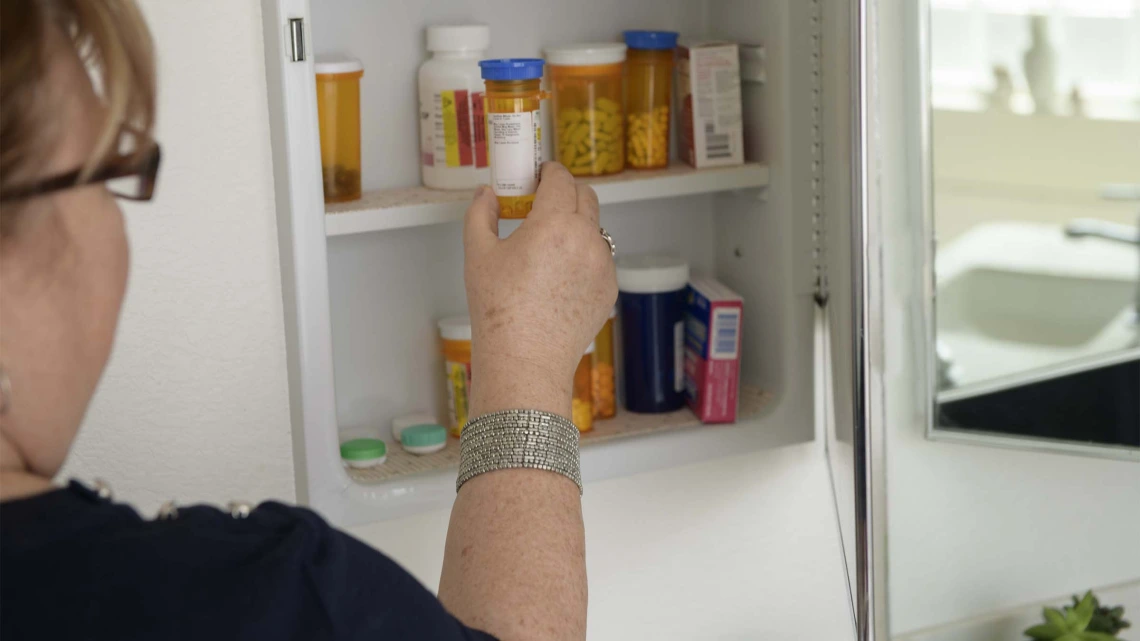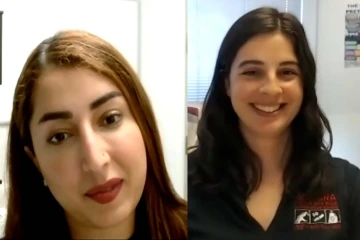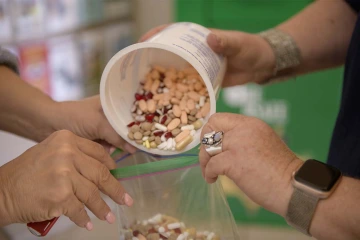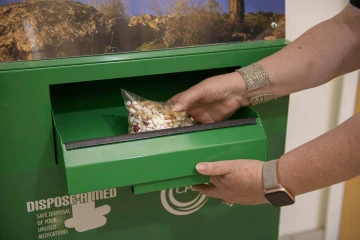Now’s a Good Time to Clean Out Your Medicine Cabinet
The unused and expired medications inside your home can be dangerous and lead to accidental exposure and unintentional poisoning.

During your annual spring cleaning, include going through the medicine cabinet to protect your family’s health and safety.
Having unused and expired medications in your home can pose major health risks to your family and the greater public. The potential risks include accidental exposure or medication confusion leading to unintentional poisoning.
Among the most vulnerable to these risks are older adults, people with impaired vision, young children and teenagers. Almost half of teen-aged children who misuse prescription drugs get them from friends and family, and young children swallowing medicine without caregiver oversight results in 60,000 emergency room visits and 450,000 calls to poison centers each year in the U.S.
Teaching medicine cabinet safety
Cleaning out your medicine cabinet was the subject of a recent University of Arizona Health Sciences presentation hosted in partnership with Wellness Wednesdays: A Community Connection, a series of lunchtime events to promote nutritious foods, healthy minds and strong bodies.

Reem Alsultan, PharmD, BCPS and Laura Morehouse, MPH, CHES (right) lead a virtual conversation about the importance of cleaning out your medicine cabinet.
“We tend to get a lot of questions about how to safely dispose of medications,” Morehouse said.
"It’s critical that we dispose of medications in a safe and effective way to ensure that we are safe, and we are protecting the community and our environment,” Alsultan added. “It’s easy to overlook the negative impact the environment associated with improper disposal such as polluting our drinking water.”
Morehouse and Dr. Alsultan shared some advice and tips you can apply on your own. Springtime, when many undertake a yearly cleaning, is the perfect time to put their suggestions to use.
Q: Why clean out your medicine cabinet?
A: Over time, medicines can be less effective or risky due to changes in chemical composition or a decrease in strength. At best, unused or expired medicine may not work; at worst, it may be harmful. According to the Arizona Department of Environmental Quality, medications that are no longer needed or expired can unintentionally poison children and animals, may be sold unlawfully, and could pass through sewage treatment plants and septic tanks and contaminate groundwater and soil if not disposed of properly.

Pills and other medications found in the medicine cabinet must be properly disposed of as a matter of public safety.
Scheduling a regular time to clean out your medications also will give you an opportunity to ensure you are storing medications in a cool, dry, secure location. Medications should be stored out of reach and out of sight of children and pets, either in high places such as above a refrigerator or in a high cabinet, or in a lockbox.
Q: How long is a medication’s shelf life?
A: It’s important to recognize all medications have a shelf life. Pay attention to changes in color, smell or taste.
Check the labels, and dispose of anything that is expired, hasn’t been used in the past 12 months or is in an unmarked container. Check the expiration dates on everything, including supplements, ointments, creams, eye drops and ear drops.
Some basic medications you should always keep on hand and up-to-date include medications to treat cough; anti-itch medications including hydrocortisone cream, calamine lotion and antihistamines; pain relievers including acetaminophen, ibuprofen and aspirin; antacids; and sunscreen.
Q: How can I dispose of medication at home?
A: Just like knowing which items in your home should be recycled and what can go into the trash, the first step in cleaning out your medicine cabinet is knowing how to properly dispose of the medications you have. Many may be surprised to know medicine should never be flushed or put down the drain because sewage treatment plants can’t remove all of the pharmaceutical contaminants, leading to the pollution of our streams and drinking water.

Unwanted drugs can be disposed of at drop-off locations like this one at the Pima County Sheriff’s Department in Pima County, Ariz.
Inhalers, needles and syringes should never be thrown in the trash. Place needles in a puncture-proof plastic container with a screw-on lid, such as a detergent bottle. Label the container “do not recycle,” keep the container out of sight and reach of kids and pets, and dispose of it in a trash can when it is three-quarters full. Most inhalers are considered hazardous waste and should not be disposed of in your home garbage. Instead, take inhalers to your local pharmacy or a proper medical waste drop-off site.
Medicine should never be flushed or put down the drain because sewage treatment plants can’t remove all of the pharmaceutical contaminants, leading to the pollution of our streams and drinking water.
Q: Where can I dispose of medications outside of the home?
A: Public take-back events are the best way to dispose of most types of unused or expired over-the-counter and prescription medications. The medications that are collected are put into a high-temperature incinerator that effectively decomposes the pharmaceutical compounds, preventing pollution of the environment.
Safely dispose of unwanted drugs in Arizona three ways:
- Find a location by using the Arizona Department of Health Services disposal dashboard.
- Twice each year, typically in April and October, the Drug Enforcement Administration (DEA) holds “National Prescription Drug Take Back Day,” offering take-back events in cities across the U.S.
- The Dispose-A-Med webpage maintains a webpage with a list of permanent locations in Pima County that will dispose of medications.
As a last resort, the FDA has approved some medications for safe disposal at home despite the potential risk to human health and to the environment. Medications listed on the Food and Drug Administration’s flush list are generally deemed highly sought-after for their high misuse and death potential. Fentanyl, morphine and buphrenorhine are examples of drugs that can be flushed down the toilet.

